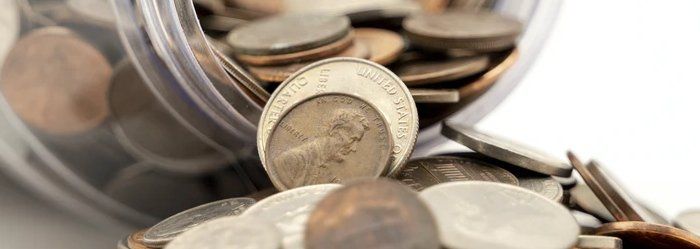Last Updated: March 11, 2024
Our financial mindsets determine how we handle our finances

Disclaimer: We are not qualified legal or tax professionals and are not giving advice. Always speak with a qualified professional before making any legal or financial decisions.
Did you know that 60% of Americans feel anxious about their finances? The root of this anxiety often isn't just the numbers in their bank accounts, it's their mindset towards money. Many struggle with saving, investing, or even just managing daily expenses, not because they can't, but because they haven't cultivated a financial mindset.
In this post, we'll explore what a financial mindset truly entails and give practical steps to not only transform your approach to money but to empower your financial decision-making. From understanding the psychological barriers to financial success to actionable tips on developing a healthier relationship with money, we'll guide you through the essentials of building a financial mindset that paves the way for lasting wealth and peace of mind.
Whether you're looking to save more, invest wisely, or simply feel more confident about your financial decisions, understanding the importance of a financial mindset is the first step towards achieving your financial goals. Let's dive in and discover how you can start making more informed, empowered financial choices today.
Want to skip the article and speak directly to a debt specialist? Click here for a
free consultation.
What is a financial mindset and how does it relate to your finances
The financial mindset is crucial to understanding your finances. It helps isolate your financial behaviors or patterns and also determines what is most important to you in life. The two biggest segments are the money mentality and the savings personality type, which can determine how you look at money.
A financial mindset is related to how you will go about your financial life now and later in life. It's a personal strategy on how to manage money, care for it, spend it, save it, invest it.
You can also think of a financial mindset as a set of beliefs about money and one's capacity to manage it. These beliefs are shaped from norms passed on by family and society, but can also be influenced by culture, education, religious beliefs, past experiences with money as well as current personal errands with their finances.
Learning tools for emotions and anxiety that relate to one's budgeting process can help in developing healthier financial mindsets.
When people have unhealthy or negative thoughts about their current financial situation, there can be self-defeating behaviors such as skipping paying an electric bill so that they feel more successful for the month financially when instead this puts them at risk to experience a larger electricity balance due (inability to collect any grid credits) than before.
Why do you need a financial mindset?
A financial mindset helps organize your thoughts, decisions, and actions around money. This can happen through informing yourself with knowledge about managing finances, or by choosing to focus on your inner emotional state.
When you make thoughtful and intentional choices about money in general--and those choices are reflected in the allocation of every dollar, then it's much easier to achieve what you want out of life. And when you know what that is, then figuring out how to get there becomes easy too.Common psychological barriers like fear, lack of confidence, or not wanting to deal with financial realities can prevent people from developing a healthy money mindset.
Here are some tips to overcome those barriers:
- Identify the specific barriers holding you back and create a plan to address them
- Start small if needed - focus on one manageable money task per week
- Enlist help from a financial advisor or money-savvy friend
- Give yourself positive affirmations around money
Informing yourself with knowledge about dealing with finances not only protects against pitfalls like spending more than you make or buying something because it's a good deal instead of an investment but also makes it easier for your mindset to be focused on managing anxiety.
How can you develop this mindset?
Believe in Yourself. The first step to developing a financial mindset is changing your thoughts about money, and what it can do for you. You have to believe that you are worthy of applying yourself to be successful financially.
Then, after achieving that belief, focus on doing the work necessary – even when it feels like you aren’t good enough or things are too difficult. Work hard at everything else – the law degree, math classes - so you can do this one thing right!
Here are some action steps you can start taking today:
- Start tracking all expenses, even small purchases like coffee
- Set savings goals and contribute automatically each month
- Read personal finance books and blogs
- Take a financial literacy course
Developing a financial mindset has benefits beyond just making more money; those skills translate into every area of life. People with an entrepreneurial nature tend to find themselves stimulated by challenges and new experiences; their sense of self-reliance makes them more confident.
Save for Retirement
Retirement may seem far off, but the earlier you start saving, the more money you will have to live comfortably when you stop working.
Aim to save 10-15% of your income for retirement starting even in your 20s and 30s. Take full advantage of any 401K match from your employer.
If your employer doesn't offer a retirement plan, open an Individual Retirement Account (IRA).
Automate transfers from your checking account to retirement accounts so the money is invested before you have a chance to spend it.
Compound interest is your friend - earnings on your earnings will snowball savings over decades. Small consistent contributions today will pay off tremendously later.
The importance of having a healthy relationship with money
A healthy relationship with money is to have a clear sense of priorities and be willing to make sacrifices in the present for what you see as your future.
A strong relationship with money means that it will always provide, that there are always opportunities or projects afoot that we're enough inside-outside of the continuum where we can do something about them.
That said, there's an acute awareness around priorities - WHERE our next dollar is coming from - and understanding the difference between need and want (or even just wanting). This might mean prioritizing secondary income streams over day-to-day expenses if needed, but only after deciding which problems may not exist if those expenses weren't there at all or replaced by new ways of living entirely.
Some ways that people have developed their financial mindsets
It's important to always practice mindfulness, with the idea that what we pay attention to becomes our reality. For example:
Whenever you spend money on something, ask yourself WHY are you buying this thing? What will it provide for me? Think about how much pleasure or ease you'll get from using it and if there's an alternative way of getting that.
Make a budget for yourself and follow it strictly
The best way to start budgeting is by first listing your monthly income and expenses. A great tool to use is a budget spreadsheet. They can easily be found with a quick Google search.
To start, decide how much you want to budget for each area and make sure to stick within these allocations. Divide your total monthly income by the number of months you have till payday.
Track all of your expenditures so that they are never in question or on the back burner. Lastly, be flexible with your allocations if you need to be.
Remember that these are just guidelines and not rules set in stone that must not be broken!
For example, if I receive $3000 a month and plan to save 25% for future purchases I will divide it by 12 since there are 12 months ((30000 /12) = 2500).
If I break this down into specific budgets ($2500 at work; $500 on groceries; $100 on gas; $100 for entertainment) I will have a very clear understanding of what I can and cannot afford to buy.
If you don't want to make a budget or worry about any of that, in the long run, here's a general guideline: As long as your total expenses are less than 50% of your take-home paycheck (after taxes), then... it's considered healthy!!!
Also, assuming the other 50% goes towards bills and living costs...
60% is considered really tight
70% is not to be taken lightly
FAQs
Conclusion
The financial mindset is a crucial component of success. It's important that you have the right tools and resources to make your money work for you so you can live comfortably in retirement or reach other goals, like paying off debt more quickly.
We hope this blog post has been helpful in showing how an appropriate financial approach might be beneficial for business owners as well as individual consumers alike.
Let us know if we've sparked an interest, or get in touch with our team today!
*Disclaimer: Pacific Debt Relief explicitly states that it is not a credit repair organization, and its program does not aim to improve individuals' credit scores. The information provided here is intended solely for educational purposes, aiding consumers in making informed decisions regarding credit and debt matters. The content does not constitute legal or financial advice. Pacific Debt Relief strongly advises individuals to seek the counsel of qualified professionals before undertaking any legal or financial actions.
✔ Accredited by Better Business Bureau with BBB A+ rating (4.93 rating and 1678 reviews)
✔ US News and World Reports and Bankrate ranked Pacific Debt Relief as one of “The Best Debt Relief Companies of 2024”
✔ 6.9 star rating by BestCompany.com (over 2379 client reviews)
✔ 4.8 star rating by TrustPilot based (over 1613 verified consumer reviews)
✔ ConsumerAffairs.com Accredited (over 544 verified reviews with an average rating of 5 stars)
✔ A Top 10 Rated Compan by TopTenReviews.com , ConsumersAdvocate.com and Top10debtconsolidation.com
✔ 4.6 star rating by Google (229 client reviews)
✔ 100% rating by SuperMoney (9 client reviews)
Reduce Your Credit Card Debt By Up to Half

BBB Reviews | 4.9/5.0 Rating









 Do Not Sell My Personal Information
Do Not Sell My Personal Information